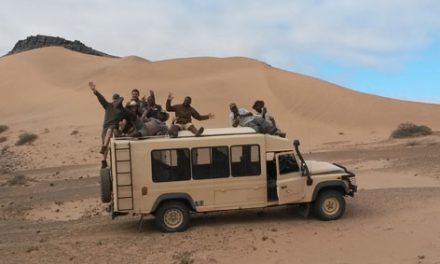
Tourism industry arguably the largest real potential for sustainability – FENATA

The Federation of Namibian Tourism Associations (FENATA) has awarded Simonis Storm a contract to conduct a brief socio-economic study on the impact of tourism in Namibia.
The study comes in response to concerns regarding the lack of recognition and awareness of the significant financial and social contributions made by the local tourism industry. With the absence of comprehensive national tourism statistics, this study aims to shed light on the industry’s role in the country.
The 15-page report, which was drafted by economic experts with input from the tourism private sector, comprises a macroeconomic overview of tourism, a socioeconomic impact study, and recommendations by Simonis Storm.
According to FENATA, key findings point to the absence of a complete reflection of tourism in Namibia’s national accounts, where the industry is represented by “accommodation and restaurants” only, omitting the immense input of transportation (road, car rental, and air), logistics, and other services, as well as tourism activity in rural areas where most lodges are located, in addition to the industry’s massive impact on conservancy development.
According to Bruce Hansen, Managing Director of Simonis Storm, “Tourism has surpassed food and automotive products to become the world’s third-largest export industry after fuels and chemicals.”
“From the last few years, there has been a great surge in international tourism, culminating in a 7% share of the world’s total exports in 2016, according to Future Business Journal, January 2021,” he noted.
Hansen also emphasized the significance of having accurate data reflecting the state of tourism in Namibia, noting that “as it is now measured,” obtaining a genuine reflection is challenging.
He said: “Tourism is essential for the success of many economies worldwide. Tourism has several benefits for host destinations. It boosts a country’s revenue, develops its infrastructure, creates thousands of jobs, and fosters a sense of cultural exchange between foreigners and residents. The significance of accurate data and statistics is key for making resourceful decisions. It is the foundation upon which informed decision-making, effective policies, and transparent governance are built. It enables us to navigate complexities, allocate resources wisely, and produce evidence-based solutions to enhance our economy and the societies that function within it. Simonis Storm, as a research house, is committed to being enablers of accurate and true information drivers that will assist in decision-making, and this report is an effort to begin to address the current shortcoming.”
According to the Chairman of FENATA, Martin Webb-Bowen, the absence of comprehensive data on the impact of tourism on the Namibian economy, in terms of both the financial contribution and the social impact on the development of rural communities, is a “major” part of the reason why authorities do not seem to give sufficient priority to the tourism sector when taking policy decisions on land access and the use of natural resources across the country.
“It is key that we, as citizens, ensure that tourism is recognized for its role in guaranteeing a future for the country and its people as this is an industry with arguably the largest real potential for sustainability,” asserted Webb-Bowen.
“For Namibia to safeguard this sustainability, decision-makers would need to make informed decisions on the exploration and development of Namibia’s natural resources and to take full account of all socio-economic aspects of that development. Tourism is one of the main economic pillars of the country, but it is not always recognized for its full impact and potential – partly due to the fragmented way in which it is reflected in national accounts,” Webb-Bowen added.
Furthermore, FENATA said that they hope that this study, when combined with the eagerly awaited 6th edition of the Namibian Tourism Satellite Account, set to be released later this year, will provide the necessary data for Namibian authorities to recognize the value of tourism for Namibia and to ensure that the pristine areas of the country that are essential as part of the Namibian tourism product are properly ring-fenced for sustainable tourism use.
“In 2020, following concerns raised about foreign leakage within the tourism industry, the Bank of Namibia (BoN) issued a report focussing on the impact of tourism in Namibia and its value to the economy. In its conclusions and recommendations, BoN clearly stated that there is enough evidence to confirm that illegal leakages in the tourism industry are mainly limited to necessary trading with international trade partners on which the industry relies for the bulk of its business.”
“The Bank also recommended that the government should escalate its efforts to support the tourism industry to enable it to grow to its fullest potential as a contributor to economic growth, job creation, and earner of foreign exchange, which will also have a positive impact on tax revenue for the government. The Bank also called for the tourism industry to receive higher priority in budgetary allocations to escalate the marketing efforts of Namibia as a unique tourist destination. Additionally, BoN has already recognized that the industry will only grow to its fullest potential once Namibia ‘is properly branded’ and marketed globally,” the Federation, adding that this requires a continuous international marketing campaign to support the current efforts of individual enterprises and the goodwill of global players who are currently doing what they can to fulfill that role.
“The tourism industry makes a large contribution to both the GDP and employment, but it needs the recognition and consideration it deserves to allow the continuing development of a sustainable, growing, and flourishing tourism business environment for generations to come. The government and other stakeholders need to identify new source markets where there is significant potential and to take a lead in creating awareness of the Namibian tourism products there. Once more Namibians benefit directly and indirectly from the tourism industry, the former perception of that the industry is only interested in the existing markets and structures will fall away,” it concluded.












































